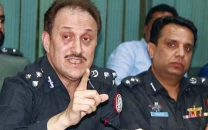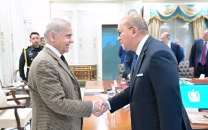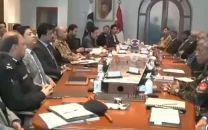Monitoring the manifestos – VII : The policymakers
Political party members who drafted the manifestos describe the intensive process behind it.

Policy hawks were deeply involved in developing manifestos for the 2008 elections, and say that the manifestos are used by political parties to strategise and develop their position on issues.
Sherry Rehman, who headed the PPP’s policy planning committee, says the manifesto was a “culmination of a long process of consultation”. PPP’s manifesto emerged from work done by the policy planning committee which had several sub-committees dealing with areas such as health, education and the economy. Rehman said the committees met throughout the year, consulted with experts in the field and submitted their drafts to the policy planning committee which would then finalise them. “Mohtarma Benazir Bhutto did not want to go into these elections without a clear policy agenda,” Rehman recalled. The final process of drafting the manifesto – which she says “we were very passionate about” – was done by Rehman, Kamal Azfar and Javed Laghari, who incorporated the policy papers into the manifesto and looked at how they would budget or mobilise funds for plans.
“We had meetings in Dubai with Mohtarma and frequent e-mail exchanges. There was a peer review process as well. Party heavyweights disseminated the document within the party, down to the union councils and would come back to us with feedback.” Rehman then finalised the manifesto with Bhutto which was launched prior to her assassination.
Sartaj Aziz, who chaired the PML-N’s policy planning committee that developed the 2008 manifesto, said, “Since we did not know when the elections would take place, we had time to develop it. We went through about six or seven drafts and input was taken from Nawaz and Shahbaz Sharif and the Central Working Committee.” Aziz said a priority such as the judiciary issue was pushed to the top of the agenda because of the ongoing crisis before the elections.
The Awami National Party’s (ANP) Bushra Gohar told The Express Tribune that it took up to nine weeks to develop the manifesto which included work by a five-member task force, and review and approval by the leadership of the party’s central and provincial councils. Gohar said, “The manifesto is rooted in ANP’s longstanding commitments to democracy, peace, social justice and provincial autonomy. Therefore, it required a compilation of its stated commitments as an election manifesto.”
Sardar Ahmed, who served as the honorary secretary of MQM’s manifesto committee for the 2002 and 2008 general elections, said the manifesto took two months of intensive work, and required communication with party leader Altaf Hussain and the Rabita Committee in Karachi and London. Priorities such as land reforms and provincial autonomy were highlighted.
According to these representatives, manifestos represent party policy and are used after parties come into power.
Rehman said PPP’s manifesto was given to each cabinet member, and recalled several meetings where the cabinet had to measure its progress with the manifesto and roll out programmes. “Mohtarma also wanted us to develop a 100-day agenda because governments often get caught up and can’t deliver ... BB did not live to see it but this agenda was updated and used,” she said, citing examples such as the rollback of curbs on the media and introducing the Benazir Income Support Programme.
“During the 1997-1999 term, the party’s manifesto was followed extensively,” Aziz said. “Every month or so, people responsible for a particular section would update the party and the cabinet about what they had done and we would draft policies based on the manifesto. Right now, many of the manifesto strategies, such as about education, are being implemented by the Punjab government.”
“When we look at the manifesto now,” MQM’s Ahmed said, “We realise that we have not achieved some things and are now highlighting those issues, such as land reforms or economic policy. Most of the points we stated for provincial autonomy were incorporated in the 18th amendment.”
Ahmed said the manifesto committee regularly follows up on the progress made and issues to be raised, and updates the Raabta Committee. “Whether it is Altaf Hussain’s speeches, our policies or television appearances by party leaders, we are projecting what was in the manifesto.”
According to Gohar, ANP internally reviews the manifesto and regular policy direction is given to the provincial government. “The party leadership, at the federal and provincial levels, take up priority matters laid out in the manifesto. The party has made significant strides in achieving its commitments in the past three years.”
Published in The Express Tribune, February 27th, 2011.



















COMMENTS
Comments are moderated and generally will be posted if they are on-topic and not abusive.
For more information, please see our Comments FAQ